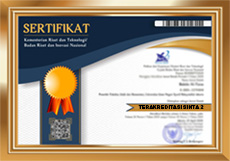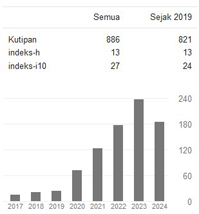Dasar Teologis bagi Implementasi Etos Global dalam Perspektif Kristen
Abstract
Abstract: This article departs from the declaration of the global ethos, which was declared by the Parliament of World Religions in Chicago, in 1993. It expresses the belief that many people can agree with the principles and values stated in it. After that the question is raised how this ethos can be implemented. To answer this question, the article follows the suggestion of Hans Küng, the initiator of the global ethos, that every religion should investigate its traditions, in order to find a deeper understanding of these values and the motivations that can help to develop attitudes that support these values. So in this article a description is made of the Christian tradition, of God’s law and the essence of sin as a force and as human action. Then the whole history of salvation is described as an attempt from God to introduce himself with His true face as God who wants humans to have life in all the abundance, which therefore can be trusted as the basis and guarantor of human life and existence. Finally follows the conclusion that this truth about God needs to be proclaimed by the Christian Church, so that in response to God’s actions and works, humans can become able to let go selfishness and compulsion to seek as much wealth and power for themselves as possible. So people can become capable of practicing the values as stated in the declaration of the global ethos.
Keywords: global ethos, parliament of world religions, God’s law, core power of sin, Paul’s theology, justification, covenant theology.
Full Text:
PDFReferences
Banawiratma J.B., “Kristologi dan Allah Tritunggal (II), Refleksi dalam Konteks Masyarakat Indonesia”, dalam idem (ed.), Kristologi dan Allah Tritunggal, Yogyakarta, Kanisius, 1986.
Drewermann Eugen, Strukturen des Bösen, Die jahwistische Urgeschichte in exegetischer, psychoanalytischer und philosophischer Sicht, Bd 1, Paderborn, Schoeningh, 1981.
Eichrodt Walther, Theology of the Old Testament, volume one, London: SCM Press, 1983.
Feiner J. & L. Vischer, Neues Glaubensbuch, Der gemeinsame christliche Glaube, Freiburg, Herder & Zürich, Theologischer Verlag, 1973.
Groenen C., Pengantar ke dalam Perjanjian Lama, Yogyakarta: Kanisius, 1992.
Gutbrod, “Artikel nomos”, dalam Gerhard Kittel (ed), Theological Dictionary of the New Testament, vol. IV, 1983, pp. 1069-1078.
Holtz Traugott, Jesus aus Nazaret, Was wissen wir von ihm?, Zürich, Einsiedeln, Köln: Benziger, 1979, pp. 75-100.
Jacobs T., Paulus, Hidup, Karya dan Teologinya, Yogyakarta, Kanisius, 1983.
Kirchberger Georg, Allah Menggugat, Sebuah Dogmatik Kristiani, Maumere, Penerbit Ledalero, 2007.
_______________, “Pembenaran hanya oleh Iman, Paulus – Luther – Trente”, dalam Nikolaus Hayon, (ed.), Tema-Tema Paulus, Ende: Nusa Indah, 1989.
__________________, “Siapa itu Allah?, Pandangan Kristen”, Pastoralia, XV/2/1989.
__________________, “Murka Allah: Refleksi Teologis Dengan Bertolak Dari Teologi Paulus”, dalam: Studia Philosophica et Theologica, vol. 10, No 1, Maret 2010.
__________________, “Teologi Karl Rahner sebagai Teologi Kontekstual”, dalam: Jurnal Ledalero, Vol. 9 No. 2, Desember 2010.
__________________, “Akar Korupsi”, dalam: Jurnal Ledalero vol. 15, no. 1, Juni 2016.
Kohl Karl Heinz, Raran Tonu Wujo, Maumere: Penerbit Ledalero, 2009.
Küng Hans, “The History, Significance and Method of the Declaration Toward a Global Ethic”, dalam: Hans Küng and Karl-Josef Kuschel (ed.), A Global Ethic, The Declaration of the Parliament of the World’s Religions, London: SCM Press, 1993.
Küng Hans, Angela Rinn-Maurer, Weltethos – christlich verstanden, Freiburg: Herder, 2005.
Phillips Anthony, Deuteronomy, Cambridge: University Press, 1973.
Rad Gerhard von, Old Testament Theology, volume one, London: SCM Press, 1979.
_____________ , Old Testament Theology, volume two, London: SCM Press, 1979.
Schlier H., Römerbrief, HThKNT Bd VI, Freiburg, Herder, 1977.
Schrenk, “Artikel dikaiosune, E. dikaiosune in Paul”, dalam Gerhard Kittel (ed), Theological Dictionary of the New Testament, vol. II, Grand Rapids: Eerdmans, 1982, pp. 202-210.
Weger Karl-Heinz, Karl Rahner, An Introduction to his theology, New York: Seabury Press, 1980.
Wess Paul, “Das Gesetz Gottes im Herzen”, https://www.uibk.ac.at/theol/leseraum/texte/821.html, diakses pada tanggal 11 Jan 2022.
https://de.wikipedia.org/wiki/Weltethos diakses pada tanggal 29 Des 2021
,
https://www.weltethos.org/hans%20k%c3%bcngs%20%e2%80%9eprojekt%20weltethos%e2%80%9c/ diakses pada tanggal 29 Des 2021.
https://www.unhcr.org/asia/what-we-do.html.
DOI: http://dx.doi.org/10.31385/jl.v21i2.314.136-149
Refbacks
- There are currently no refbacks.

This work is licensed under a Creative Commons Attribution-NonCommercial-ShareAlike 4.0 International License.

Copyright© 2015 JURNAL LEDALERO This work is licensed under a Creative Commons Attribution-NonCommercial-ShareAlike 4.0 International License.
Institut Filsafat dan Teknologi Kreatif Ledalero Jalan Trans Maumere-Ende - Sikka - Flores - Nusa Tenggara Timur - Indonesia Telp/Fax: 0382 2426535










